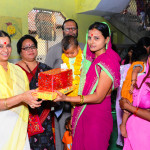Recently, the Andhra Pradesh government has digitized data of pregnant women and malnourished children. While the main reason behind this is to ensure that the pregnant women are getting the benefits of the various health schemes available to them, it can also help in tracking down any pre-natal sex selection that takes place. Earlier, the Haryana government also launched a similar drive to track pregnant women, so as to curb the rampant pre-natal sex selection taking place in the state.


Centre for Social Research, is against this concept of tracking pregnant women for many reasons, some of which have been elaborated by Dr.Manasi Mishra, Head of Research.
- Even with the best of intentions as part of an attempt to address pre natal sex selection, tracking pregnant women violates women’s human and reproductive rights. It also breaches the confidentiality that women are guaranteed under the Medical Termination of Pregnancy(MTP) Act.
- The PCPNDT Act includes a clause (Sec 24) which provides immunity to the pregnant woman, presuming that she is compelled by her family members to undergo pre-natal diagnostic techniques for purposes of illegal sex determination. In this regard, tracking women would be a regressive measure that would criminalize them, thus ignoring the socio-cultural context in which women live, and would restrict their access to safe and legal abortion.
- According to estimates only two to four percent of abortions in India are for reasons of sex selection; furthermore, while sex determination takes place mostly in the second trimester of pregnancy, only about 13 % of reported abortions are in the second trimester, and 80-90% of reported abortions take place in the first trimester. Not all second trimester abortions are likely to be sex selective; cases of delay in seeking abortion are common amongst poor, young and unmarried women who are often poorly informed on many fronts. Tracking of pregnancies would further reduce the window available to such women who are already vulnerable, forcing them to turn to unsafe abortion services, thus risking their health.
Dr Mishra goes on to say that “From an efficiency and feasibility perspective, it would make sense to adopt an approach that focuses on tracking registered facilities (that are likely to count in the range of 50,000) as opposed to tracking millions of pregnant women“.
Many developed nations across the world have a proper scheme of tracking pregnant women, so that adequate resources and medical facilities can be provided to them. While the intention behind it is noble, this system is not practical for India.
Looking forward to reading your blogs, you can mail us your entries at WriteWithUs@csrindia.org, or upload them at Write With Us.
Donation for Centre for Social Research to Join our effort in rehabilitating Domestic Violence
Discuss this article on Facebook




